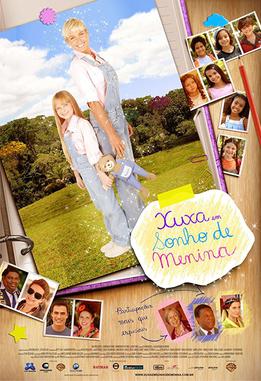Related Research Articles

Diamantina is a Brazilian municipality in the state of Minas Gerais. Its estimated population in 2020 was 47,825 in a total area of 3,870 km2.

Ana Paula Arósio is a Brazilian former actress and model. She has lived in Swindon, Wiltshire, England since 2015.

VH1 Brasil was a music channel from Viacom-owned Viacom International Media Networks The Americas. The network was launched in November 2005 on some cable systems, but it was not until May 2006 that it was launched on DirecTV Brazil, replacing MTV Latin America.

Alice Dayrell Caldeira Brant was a Brazilian juvenile writer. When she was a teenager, she kept a diary, which describes life in Diamantina, Minas Gerais, Brazil which was then published in 1942. The diary was published under a pen name Helena Morley. When it was originally published it was in portuguese under the title Minha Vida de Menina. The diary was then translated in to English by Elizabeth Bishop in 1957.

Maitê Proença Gallo is a Brazilian actress, television presenter and writer.

Marieta Severo da Costa is a Brazilian stage, film and television actress. She is best known to youth audiences as the archetypal mother figure in popular sitcom A Grande Família (2001–2014), as well to mature audiences for portraying villains in telenovelas.

Débora Susan Sanches Duke best known as Débora Duarte, is a Brazilian actress.

Fernanda Arrias Machado is a Brazilian actress. She is best known for her role as Maria in the film Tropa de Elite.

Viver a Vida is a Brazilian telenovela broadcast by TV Globo from September 14, 2009 to May 14, 2010. It is written by Manoel Carlos in collaboration with Ângela Chaves, Cláudia Lage, Daisy Chaves, Juliana Perez and Maria Carolina. Directed by Teresa Lamprey, Frederico Mayrink, Luciano Sabino, Leonardo Nogueira, Adriano Mello and Maria José Rodrigues. It is directed by Jayme Monjardim and Fabrício Mamberti. Topbilled by Taís Araújo, José Mayer, Lília Cabral and Alinne Moraes and Mateus Solano. Originally it ran for 209 episodes but internationally the episodes are condensed into 100.
Por Amor is a Brazilian telenovela created by Manoel Carlos, starring Regina Duarte and Gabriela Duarte in the main roles. It replaced A Indomada and preceded Torre de Babel, and was the 55th telenovela to be aired by TV Globo.

Bianca de Souza Mendes Comparato is a Brazilian actress. She has starred in Como Esquecer in 2010, as well as A Menina sem Qualidades and Somos tão Jovens, both in 2013, the latter for which she won the Grande Prêmio do Cinema Brasileiro as Best Supporting Actress for her role of Carmem Teresa. In 2016, she starred in the Netflix series 3%, gaining international attention and acclaim for her portrayal of the series' character, Michele.
Ludmila Dayer-Middleton is a Brazilian-American actress, director and producer.

Leticia Pena Spiller is a Brazilian actress, producer, director, poet, dancer, writer, and singer-songwriter.

Carmen Miranda: Bananas is My Business is a 1995 documentary filmed and directed by Helena Solberg. This documentary chronicles the life and career of Carmen Miranda, Hollywood's symbol of Latin American spirit in the 1940s. The documentary tells her life story in a series of stages, beginning with her roots and rise to stardom in her home country of Brazil, her transition and development as a performer in the United States, first on Broadway in New York City, then in the film industry after she signed with 20th Century Fox in Los Angeles, and her later years in life, before her death and her return to Brazil. Helena Solberg uses two different film styles, biography and directorial reverie, in which Solberg uses actor Erick Barretos to “resurrect Carmen Miranda in several fantasy sequences. Helena Solberg's attitudes shift throughout the documentary from awe-struck child to empathetic and forgiving Brazilian woman, which she uses to represent the contradictory subplots of Carmen Miranda's life. Alongside the fantasy like resurrection of Miranda, Solberg accompanies her documentary with multiple interviews with Carmen Miranda's friends and family, like her sister, her first boyfriend, the guitarist Laurindo Almeida, samba song-writer Synval Silva, Cesar Romero, and Alice Faye.

Maria José Motta de Oliveira, known as Zezé Motta, is a Brazilian actress and singer. She is considered one of the most important actresses in Brazil.

Cleyde Yáconis was a Brazilian actress.

Bruna Reis Maia, known professionally as Bruna Marquezine, is a Brazilian actress, filmmaker, and model. She debuted on television in 2000 as one of the children interviewers for the children's program Gente Inocente. She has been part of the cast of several telenovelas. Throughout her career, she has been awarded the Troféu Imprensa, Contigo Award! 2004, and Young Brazilian Award, among others. She plays Jenny Kord, a love interest for Jaime Reyes in the DC Universe film Blue Beetle (2023).
Helena Solberg is a Brazilian-born documentarist who, since 1971, has made her career in the United States. She is recognized as the only woman to participate in "Cinema Novo" movement in Brazil.

Xuxa em Sonho de Menina is a 2007 Brazilian fantasy children's film, written by Flávio de Souza and directed by Rudi Lagemann. It was the first film with the actress Xuxa to be directed by Conspiração Filmes, and was distributed by Warner Bros. and Globo Filmes. The film starred Xuxa Meneghel and Letícia Botelho, with the participation of Carlos Casagrande, Alice Borges, Betty Lago, Dirce Migliaccio, and Marcelo Adnet.
Vera Nunes, stage name of Isaura Nunes Martins Henriques, was a Brazilian actress.
References
- ↑ Rubin, Nani (April 5, 2014). "Helena Solberg, a única mulher do cinema novo, ganha retrospectiva". O Globo (in Portuguese). Retrieved July 8, 2014.